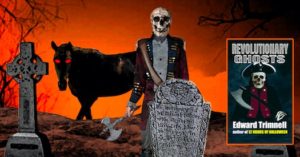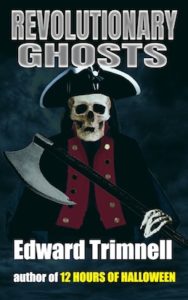New to Revolutionary Ghosts?
Click here to read the previously posted installments
Click here to get the entire book!
***
I was halfway to the McDonald’s late that afternoon when the Bonneville’s dashboard oil light lit up.
My car was leaking oil. I had been in denial about this fact; I’d been putting off the problem. Within the short time that I’d owned the car, however, the oil leak had evolved into a major headache. My first vehicle purchase–my first really big, adult decision–had been fundamentally flawed.
And if I’d only listened to my father, I could have avoided the debacle.
I had found out about the Bonneville through a local “for sale or trade” newspaper. (This was how people commonly disposed of unwanted items before the Internet and Craigslist.) The owner of the car lived just a few miles away from us. I called the number listed for the owner, and made an appointment to look at the car.
I asked my father to accompany me. He knew a lot about cars, after all. But I ignored the basic rule of utilizing the superior knowledge of others: If you borrow or rent someone else’s expertise, then listen to what the expert has to say.
I wasn’t in a listening mood. The gleaming white paint job of the 1968 Bonneville instantly pulled me in. Also, I had gotten the impression that there weren’t many cars for sale in the immediate area. I feared that I might be shopping in a seller’s market, with all the disadvantages that entails. I didn’t want to miss out.
But a bad deal is a bad deal, even in a seller’s market. The Bonneville had a slow oil leak.
This wasn’t hard to detect. My father noticed a telltale puddle on the driveway. He was alert to that sort of thing.
When Dad asked the owner about the black puddle, the owner told him–us–that the oil had come from his wife’s car (which was conveniently elsewhere at the time).
Dad was openly skeptical of this explanation. For a brief moment, I thought that he was going to outright accuse the owner of lying, and a serious argument (or maybe even a brawl) would result.
In the end, though, Dad let me make my own decision. I wanted the car, and I would buy it with my own money–money I had earned at my McDonald’s job, and from various lawn-cutting gigs the year before.
“It’s your decision, son,” my dad had said. “It’s your cash, after all. But I would advise you to hold off.”
While the owner of the car stood there scowling at my father, I took less than half a minute to make up my mind.
“I want this car,” I said.
And so I bought it.
I now knew that my dad had been right, though. Since I had purchased the Bonneville, I had been refilling the car’s oil supply practically every other day.
I had already called the owner and complained that he’d told me a lie and sold me a lemon. The man brusquely informed me that the sale was final, and hung up the phone on me.
Theoretically, I suppose, it would have been possible for me to get my money back through legal channels, but who was going to do that in southern Ohio in 1976, for a used car?
Not many people, I didn’t think, and certainly not me.
But now I was on my way to work, and my car needed yet another infusion of 10W-30 from the folks at Pennzoil. There was a Sunoco station on the way to the McDonald’s. It was a large station that sold various automotive supplies.
I had left home a few minutes early, and I figured that I had time to stop for a quart of oil without being late for the six o’clock shift at McDonald’s.
And besides, what choice did I have?


